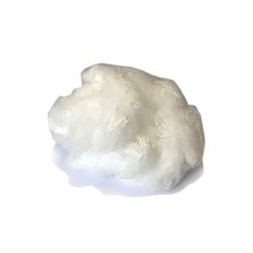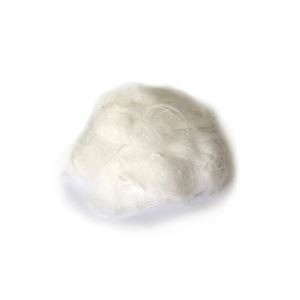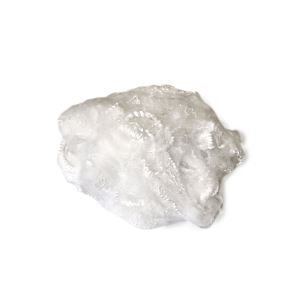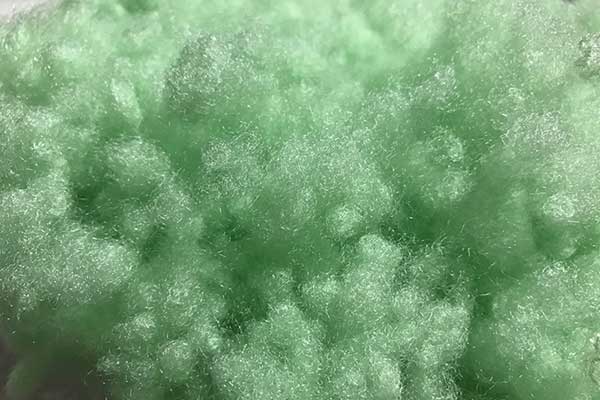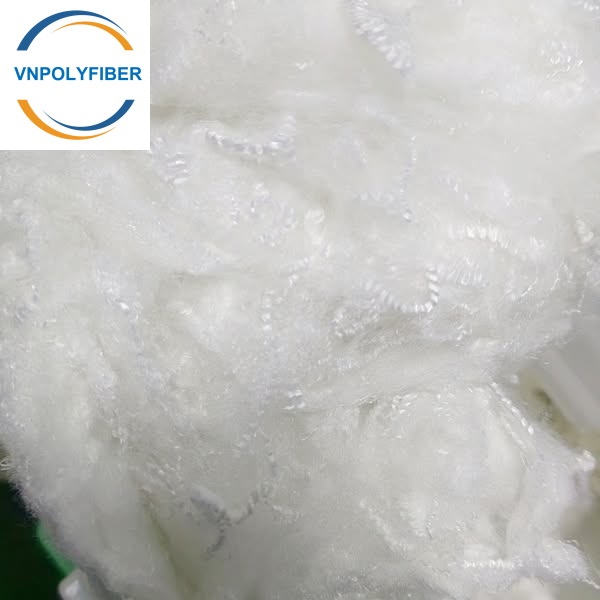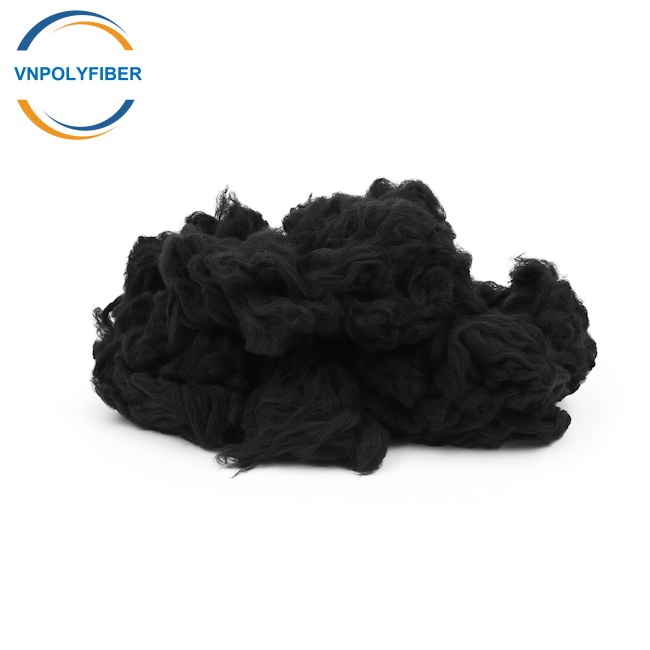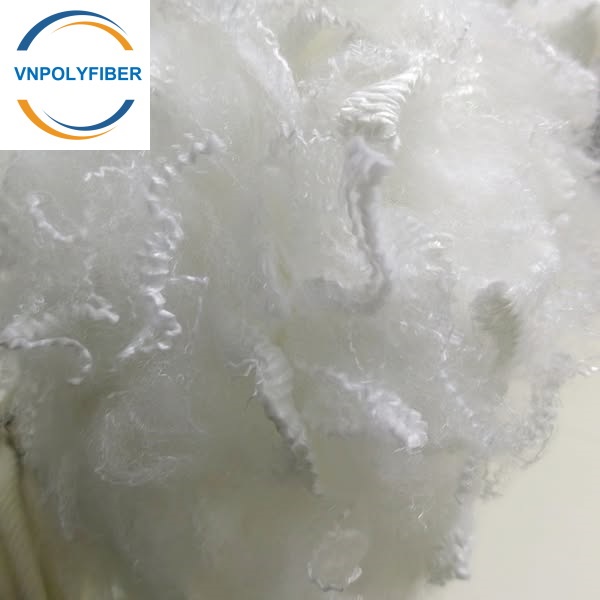Polyamide Staple Fiber
- Denier: Typically ranges from 0.9 to 15 denier, subject to specific application needs.
- Cut Length: Common lengths include 38 mm, 51 mm, 64 mm, and 76 mm.
- Tenacity: Generally found between 4.0 – 7.5 g/denier, depending on the strength requirements of the application.
PRODUCT DETAIL
What is Polyamide Staple Fiber
Polyamide staple fiber, commonly referred to as nylon staple fiber, is a synthetic fiber derived from polyamide polymers, primarily Nylon 6 or Nylon 6,6. These fibers are processed into short lengths, termed “staple,” for utilization in a variety of textile, nonwoven, and industrial applications. Polyamide staple fiber is renowned for its strength, durability, elasticity, and its resistance to wear and environmental conditions.
Key Features of Polyamide Staple Fiber
– High Strength: Polyamide fibers are distinguished by their exceptional tensile strength, providing high durability and resistance to wear and tear.
– Elasticity and Resilience: The excellent elasticity and recovery characteristics of polyamide staple fibers make them ideal for applications requiring stretch, such as activewear, hosiery, and knitwear.
– Lightweight: Despite their robust properties, polyamide fibers maintain a lightweight profile, enhancing the comfort of garments and minimizing the overall weight of industrial materials.
– Abrasion Resistance: These fibers exhibit remarkable abrasion resistance, making them a preferred choice for applications in carpets, industrial fabrics, and protective gear subjected to significant wear.
– Chemical Resistance: Polyamide fibers possess resistance to various chemicals, oils, and fuels, rendering them suitable for industrial applications where exposure to harsh substances is a concern.
– Moisture Absorption: Polyamide fibers are hygroscopic, allowing for moisture absorption; however, they dry more quickly than natural fibers such as cotton, making them suitable for activewear and outdoor gear.
– Heat Sensitivity: With a relatively high melting point (approximately 215-250°C), polyamide can withstand moderate heat. Care should be exercised during processing to avoid potential deformation from excessive heat.
– Dyeability: Polyamide fibers can be readily dyed, which facilitates the achievement of vibrant, long-lasting colors ideal for fashion and home textiles where color retention is critical.
Applications of Polyamide Staple Fiber
– Textiles:
– Apparel: Utilized in sportswear, hosiery, swimwear, and lingerie due to its elasticity, moisture management, and lightweight nature.
– Home Textiles: Commonly employed in upholstery, curtains, and carpets owing to their durability and resistance to wear.
– Nonwoven Fabrics:
– Medical and Hygiene Products: Soft and non-irritating, polyamide staple fibers are used in disposable medical textiles and hygiene products.
– Geotextiles and Filtration: Their strength and chemical resistance make them useful in nonwoven geotextiles and filtration materials.
– Industrial Nonwovens: Applied in areas such as automotive interiors, insulation, and protective gear.
– Industrial Applications:
– Carpets and Rugs: Polyamide staple fibers are employed in carpets and rugs, providing excellent durability, resilience, and color retention.
– Technical Fabrics: Used in technical textiles for automotive, aerospace, and industrial sectors due to their mechanical strength and resistance to environmental stress.
– Composite Materials: Polyamide staple fibers reinforce composite materials in products that demand both strength and flexibility, such as industrial components and protective clothing.
Benefits of Polyamide Staple Fiber
– Exceptional durability for long-lasting applications.
– High elasticity suitable for stretchable fabrics.
– Resistance to environmental factors, including moisture, chemicals, and abrasion.
– Lightweight and comfortable, making it ideal for clothing and consumer products.
– Versatile applications ranging from fashion textiles to industrial uses.
Technical Parameter
Common Specifications of Polyamide Staple Fiber
– Denier: Typically ranges from 0.9 to 15 denier, subject to specific application needs.
– Cut Length: Common lengths include 38 mm, 51 mm, 64 mm, and 76 mm.
– Tenacity: Generally found between 4.0 – 7.5 g/denier, depending on the strength requirements of the application.
Common Types of Polyamide Staple Fiber
– Nylon 6 Staple Fiber: Known for its lower melting point (~215°C), high strength, and excellent elasticity.
– Nylon 6,6 Staple Fiber: Offers a higher melting point (~250°C) along with superior strength and durability, making it suitable for more demanding industrial applications.
Video
FAQ
1. What do you offer?
We produce recycled hollow conjugated siliconized and non-siliconized polyester staple fiber mainly.
We also supply home textile machineries and products at factory origin and its price.
2. What is it used for?
Our fiber is widely used in filling, non-woven fabric, spinning, bedding stuff, home textile, automotive interiors…
3. Are you a factory or a trading company?
We are a factory specialized in polyester staple fiber for many years but now we also have our own professional trading company. We will source many types of textile products such as yarn, PP fibers from others to supply our own customers as well. We also provide our own customers with other related products such as: Foam, Pillows, Cushions, Toys, Down/ Feather,…
4. Where is your factory location?
Our factory locates in the north and the south of Vietnam. You can visit us from Ho Chi Minh City and Hanoi City, Vietnam. You could contact our salesman to fetch you if visiting.
5. Can you accept free sample?
Yes, the hand sample is free when not exceed 1 kilograms. Upon price confirmation, we will provide a sample within 2-3 days; the freight cost will be charged to client.
6. Can you provide ODM service?
Yes, we work on ODM orders. Which means size, material, quantity, design, packing solution, etc, will depend on your requests, and your logo will be customized on our products.
7. How about your quality? What’s the minimum order Quantity (MOQ)?
Please try a trial order, you will know it. The MOQ is 23,000 Kilograms/order, but the price will be lower if you order bulk volume.
8. Can I mix different items in one order?
Sure, you can mix any products we can provide.
9. How can you guarantee the product quality?
We have experienced QC team. We control not only productive process but also raw material. In addition, we have different kinds of testing instrument to help us guarantee the product quality.
10. What’s the payment terms?
L/C at sight, 30% TT in advance are mostly accepted; other terms shall be negotiable by both sides
For more information, please feel free to contact :
Mr. Tony Tan
Mobile number: +84 90 466 5251 (Whatsapp/Wechat/Viber/Signal)

